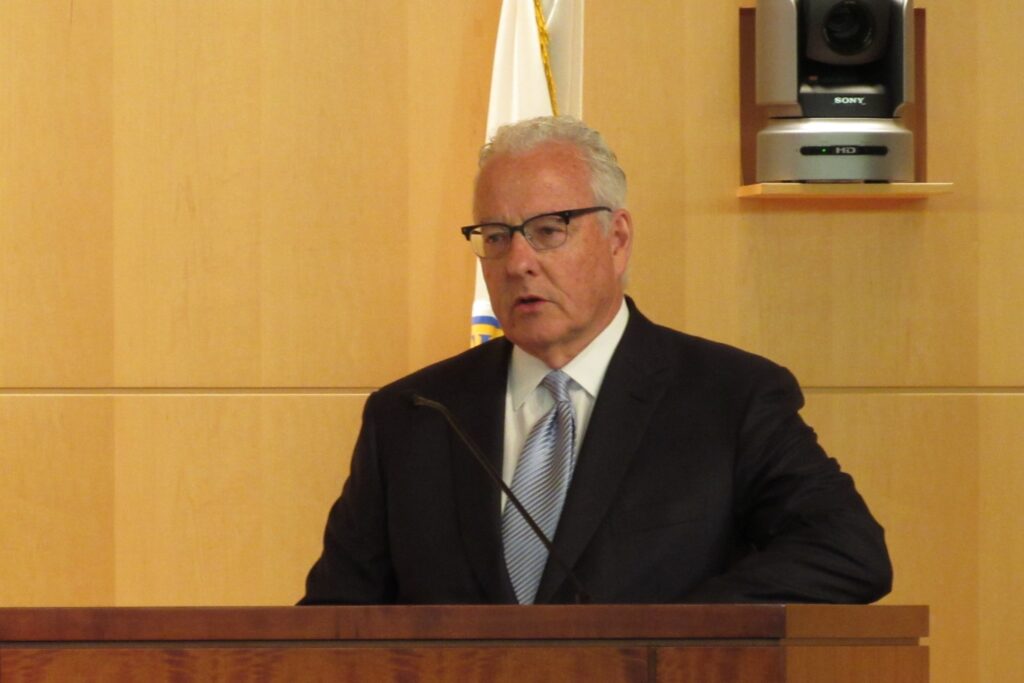
Related article: XRP Army, why keep fighting (Part 1): Adults in the room
SEC lawsuit
John Deaton is a former Marine. With a muscular, menacing beard, he’s also a lawyer who represents victims of mesothelioma and asbestos cancer. He is not a cryptocurrency lawyer. However, he has invested in XRP, Ethereum, and Bitcoin (the smallest XRP holding), and in December 2020, he began getting involved in a problem he never imagined he would be so deeply into. SEC lawsuit against Ripple.
At first, he didn’t think it was a big deal. “Companies can get sued. I thought it would be a traditional securities lawsuit,” he recalls. Mr. Deaton examined the complaint in detail.
“The complaint essentially said that all XRP is a security regardless of the circumstances surrounding its sale. I did not understand”
The SEC complaint was so broad that Deaton wondered if the complaint itself was a “weapon” and “intended to do damage.”
speculation of lawyers
At first it was just speculation. Deaton then began to connect the dots.
First, then-SEC Chairman Jay Clayton filed the lawsuit on December 22, 2020, the last day of his term. This seemed strange timing.
The SEC only targeted Ripple, not Bitcoin or Ethereum. Later, Deaton saw a letter from Joseph Grundfest, a law professor who had liaisoned with the Ethereum founders at the SEC. Grundfest sent the letter just days before the lawsuit was filed.
Grundfest had warned the SEC of the lawsuit. The reasoning is that the lawsuit “will cause substantial harm to innocent XRP holders regardless of the final determination” and that “if the SEC seeks to maintain its fairness tradition, Ethereum (ETH) and XRP should be treated in the same way, if we allow Ethereum to be freely traded in the market, then XRP should be treated the same, and if XRP is restricted, so should Ethereum.” .
However, Ethereum and XRP were not treated the same. Grundfest’s warnings were ignored (Deaton obtained the letter through the Freedom of Information Act and posted it on his own website).
On January 1, 2021, nine days after filing a lawsuit against Ripple, Deaton took independent action against the SEC. “I simply asked the SEC to amend the complaint to cover only Ripple,” Deaton said. Deaton argued that if the SEC targeted XRP, it would be “harming innocent people who have nothing to do with Ripple.”
devastating impact
And those people actually got hurt.
XRP Drops Below 20 Cents After SEC Lawsuit. US exchanges, including Coinbase, have delisted XRP. One analysis estimates that it lost as much as $15 billion in market capitalization.
“It was devastating,” said one member of the XRP Army, which goes by the name of “James Rule XRP.” He’s 56, has a friendly Texas accent, and used to work in an oil refinery. He is a true believer in the Ripple project and has reportedly converted his entire 401k to XRP. He has a daily YouTube show that mainly deals with XRP.
James briefly became a “crypto millionaire” once. In 2017, he got a license plate called “XRP RICH”. James said he still believes in the project and hopes to get rich on XRP, but for now he’s “cash poor”.
He now works at Lowe’s, a home improvement store (he speaks humbly and humorously about his switch to manual labour, and is a role model for his younger co-workers “even when he’s sweaty”). said it was fun).
When Deaton sued the SEC, he invited other XRP holders to join. James jumped on it. Then tweets about Deaton’s actions flew all over the XRP Army. 2000 XRP holders soon joined. Then 5,000 people. And now, with over 75,000 XRP holders named in Deaton’s lawsuit, Deaton has earned the official status of “Amicus Curie” in the SEC case against Ripple. Broadly speaking, his views will be considered by the courts.
What is the SEC’s motivation?
Deaton, meanwhile, had something on his mind. If this lawsuit is really a weapon against Ripple, what is the motive?
He continued his investigation. We have access to the records of another key person in the case, former SEC corporate finance director William Hinman. Hinman gave a speech on June 14, 2018, stating that Bitcoin and Ethereum are “not securities.” This speech effectively gave Bitcoin and Ethereum a “free pass”. Over the next five years, many in the cryptocurrency industry would analyze the speech closely.

 William Hinman Former Director of Corporate Treasury, SEC
William Hinman Former Director of Corporate Treasury, SECWhy did Hinman give only Ethereum special treatment (besides Bitcoin)?
“Former SEC Chairman Jay Clayton never talked about a specific token. Chairman Gensler never talked about a specific token to this day. You won’t talk,” Deaton said.
Why did Mr. Hinman speak? “The cynic in me thought, ‘Hinman has something to do with Ethereum and Bitcoin,’” he continued.
“Decentralized Justice”
Deaton investigated further. And thanks to Twitter influencers like DAI and Kaims, the XRP Army has also started looking for more evidence. Deaton called this “decentralized justice.”
They found an old video of a crypto conference. I’ve been looking for footage of an unnamed meetup. And many in the Ethereum community have dragged out evidence that they would almost certainly prefer to keep hidden.
As a result of a disclosure request that must be filed by a federal employee, Deaton “during less than four years in office with the SEC, (Hinman) received $15 million from law firm Simpson Thacher. I figured it out.
This is important for two reasons. First, Hinman worked at Simpson Thatcher before and after his tenure with the SEC. And Simpson Thatcher was a member of the Enterprise Ethereum Alliance (EEA), an industry group dedicated to promoting the use of Enterprise Ethereum.
double standard
Now it’s no longer just Deaton and the XRP Army having suspicions. Empower Oversight, a non-profit oversight agency that seeks government transparency, sues the SEC, pointing out a “clear conflict of interest.” He demanded the release of all documents related to Simpson Thatcher.
$15 million may have just been a large pension benefit, or it could just be a coincidence. It may have been deferred compensation for a previous job at the SEC.
However, the XRP Army wonders if the $15 million helped Hinman decide to give Ethereum a free pass and not XRP (Hinman later worked at the SEC). said he was unaware of Simpson Thatcher’s involvement in the EEA, and a “person close to Mr. Hinman” told Fox Business that the $15 million was nothing more than a generous pension benefit.)
The XRP Army has found even more evidence. In early 2014, before Ethereum was born, a young Vitalik Buterin answers questions about an Ethereum IPO.
XRP proponents see this as the smoking gun. When the most famous co-founder literally called the ICO a “fundraising,” could XRP be the only security, not Ethereum?
The subtlety here is that Hinman effectively acquiesced to an Ethereum ICO by saying in his speech that “fundraising aside,” Ethereum is not a security. To the XRP Army, this is equivalent to saying, “Icebergs aside, the Titanic was a great voyage.”
Deaton’s website contains an exhaustive timeline of cases of hypocrisy, double standards, and conflicts of interest. This is the heart of ETHGate.
Deaton finds connections between early Ethereum backers and companies like JP Morgan and Andreessen Horowitz, suggesting a pattern of collusion between Ethereum officials and the SEC, stating that “CeonsenSys is a quorum ( Quorum) was advised by former SEC Chairman Jay Clayton’s former law firm, Sullivan & Cromwell, four months before the SEC sued Ripple.” there is
There are also “whale videos,” DAI said, citing an old video somehow obtained by the XRP Army. It filmed a 2014 Silicon Valley conference with Ethereum co-founder Joseph Lubin. This was shortly before the Ethereum ICO. Someone asked Rubin, “Is there a limit to how much money can be invested in Ethereum?”
While the video is audio-only, Rubin said:
“One person can buy from many different identities. We may[…]limit how many[…]If you’re going to invest a dollar’s worth, you can invest multiple identities.”
The XRP Army is appalled by this. “These fake whales were quietly buying tons of Ethereum behind the scenes.
He said the founders of Ethereum like to brag about “decentralization”, but “it was bullshit from the start” because there was a fake whale that bought a lot of Ethereum with multiple anonymous identities. asked for comment but did not respond).
conclusive proof
Ethergate has different levels of views. Some believe that the SEC simply had a conflict of interest, which is ugly but not sinister. Others consider it the biggest financial scandal of the century. One XRP Army believes Ethergate is bigger than Enron.
Some suspect cheating. “I think[the Ripple lawsuit]was used as a weapon,” said Kimes.
“How did the SEC come to the conclusion to sue Ripple? Why not another company?”
In his theory, Ethereum backers feared XRP would become a real threat (what if XRP partnered with the Fed?) and sabotaged Ripple by making it a captive of regulation.
Deaton, Kaimes, DAI, and the XRP Army believe they have all the evidence they need to establish a clear conflict of interest. Moreover, they believe the “Hinman Papers” make their claims undeniable.
When Hinman delivered his fateful speech in 2018, which effectively gave Bitcoin and Ethereum a free pass, he was discussing internally how the SEC should approach Ethereum, XRP and other crypto assets. . The Hinman documents (related emails and documents) will help you figure it out.
Deaton and the XRP Army had asked the SEC to release the Hinman documents as if they were the definitive proof of President Kennedy’s assassination, but the SEC refused. “You don’t know what’s in it until you see it,” Kaimes admitted, but thought it included “everything from shameful to criminal.”
In the end, XRP and Ripple’s case was granted, and the court ordered the Hinman documents to be released. It was released on June 13th.
The crypto community, including crypto media, has largely ignored or avoided this feud between the XRP community and Ethereum. Fox Business was one of the few media outlets to cover the story.
“I think there’s a significant conflict of interest,” said Eleanor Terrett, who did her own extensive research and co-wrote the 9,000-word article for Fox Business. It is not something that should be judged by the government,” he continued.
Tellett suspects that this unsightly confrontation has something to do with the “Amakudari” nature of the government and the private sector. Because it is (problematically) common for government officials to receive large salaries from companies they once regulated. Unfortunately, it’s not a crime.
Tellett later said it was notable that the SEC had been so reluctant to release the Hinman documents, saying, “You can’t help but imagine there’s something out there that the SEC doesn’t want the public to see.” .
team ripple
But why is this even important?
At the most obvious level, as Grundfest once argued in a letter to the SEC, XRP holders have seen their investments languish. It’s real money for real people.
Just ask the 56-year-old employee of a hardware store in Texas. Their lawsuit hurt investors, even though the SEC’s job is to protect them. This is no small matter. 4.5 million wallets hold XRP. And according to Garlinghouse, the lawsuit cost Ripple Labs $200 million.

 Ripple CEO Brad Garlinghouse (Danny Nelson/CoinDesk)
Ripple CEO Brad Garlinghouse (Danny Nelson/CoinDesk)On a deeper level, the lawsuit is almost certainly stunting the growth of the XRP Ledger ecosystem. “It is affecting us,” said Adam Kagy, CEO of XRP Cafe, which is looking to build an NFT platform on top of the XRP Ledger. VCs are hesitant to step into the XRP ecosystem because of this lawsuit.”
DAI said it might have been XRP, not Ethereum, that served as the hub for Dapps (decentralized apps), NFTs and innovation, had it not been hampered by the SEC lawsuit.
Opinions will be divided as to whether Ripple was maliciously targeted. Not all XRP armies believe in conspiracy theories.
“I don’t think there is a big conspiracy to hold back Ripple,” said “Your Bro Quincy,” an XRP advocate and crypto social media influencer speaking at the XRP convention in Vegas.
But at the very least, the XRP Army has a valid basis for alleging that, whatever the motives, the SEC double standards existed, creating an unfair situation.
“I think the XRP army is right to be upset that their project is the only one that has been targeted,” said Preston Byrne, a crypto attorney at law firm Brown Rudnick. (Mr Byrne is known for his outspokenness).
Byrne said the Ethereum Foundation was “fundamentally doing the same activity” as Ripple, which sold its tokens in the US for a profit, so “the two projects should suffer similar consequences. It is not.”
In a way that lends further credence to the XRP Army’s allegations, Byrne said that the SEC should “leave Ethereum alone in the name of technology,” as it seeks to “provide support from Ethereum proponents and those who hold large amounts of Ethereum.” He added that he had been the target of a “massive marketing campaign.”
But there are subtleties here too. Byrne said there could be other reasons the SEC chose to prosecute Ripple over Ethereum, including Ripple selling XRP on the secondary market.
“If you put your tokens on the market on January 1st and you shouldn’t have done that, it’s a violation,” Byrne said.
“If you do the same thing again on March 10th, it will be another violation.” “It would have been easy to target Ripple,” he said, as the violations were repeated.
What about conspiracy theories bigger than Ethergate? Byrne said with a straight face that “ConsenSys is made up of human lizards (humanoid reptile-like aliens) is absolutely true” (ConsenSys was founded after Rubin co-developed Ethereum Ethereum-related development company).
The final surprise is that the cryptocurrency community, which has long snubbed XRP, is now rooting for Ripple. If the court decides that XRP is not a security, it could provide the industry with the clarity it has long sought. Suddenly, much of the crypto industry turned to “Team Ripple.”
Ryan Selkis, CEO of cryptocurrency data firm Messari, said in March, “I was critical of Ripple in the past…but now I feel more solidarity with Ripple than ever before.” and continued by saying:
“Ripple should win the excessive lawsuit and the XRP Ledger should be given a chance to compete fairly in digital payments (infrastructure) around the world. The demand is there!”
Forbes contributor Sam Lyman tweeted, “Now the XRP Army owns the entire crypto industry.”
Whereabouts of the lawsuit
But there are other possible developments. Byrne believes the XRP Army may get what they’ve been asking all along: the equivalent of Ethereum, but not in the way they expect. Be careful what you want.
“It’s clear that SEC Chairman Gensler is belligerent now, and no one will be spared. It’s clear that equal treatment applies across the board,” Byrne said. I interviewed Byrne before the SEC sued Binance and Coinbase, and it seems that Byrne’s prediction of “fighting attitude” was correct.
Byrne predicts that instead of XRP being treated as a non-security like Ethereum, Ethereum (and almost all crypto assets) will be treated as a security like XRP.
He believes Ripple has a 95% chance of losing and the SEC will ultimately have to follow the law enacted by Congress. In other words, the XRP Army should “target Congress, not Ethereum.”
“At the moment, with that framework, the SEC has no choice.”
Of course, not all lawyers interpret it this way. In a column for Bloomberg Law, John Deaton countered by citing why XRP is not a security.
Drummer Brad Kimes believes Ripple will win. Same with many of the DAI and XRP armies. Among them is James from Texas, who has literally staked his entire fortune on the fate of XRP. He predicts that if Ripple wins, the price of XRP will be in the “double digits” of $10, or 20 times what it is today.
“I’m just a guy in Southeast Texas sitting at a kitchen table looking out the window at cows and horses and chickens,” James said.
“Sitting here, living frugally, I know that in the near future I can have whatever I want.”
※Titles omitted
|Translation and editing: Akiko Yamaguchi, Takayuki Masuda
|Image: Shutterstock
| Original: Why the XRP Army Keeps Fighting
The post Why XRP Army Continues to Fight (Part 2): Suspicion of “Ethergate” | CoinDesk JAPAN | Coin Desk Japan appeared first on Our Bitcoin News.

 2 years ago
107
2 years ago
107














 English (US) ·
English (US) ·